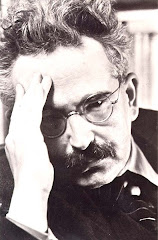Tuesday, November 25, 2008
A Yom Kippur Joke
On Yom Kippur Eve the Rabbi of the congregation went up before the ark, bowed low, and said in a whisper, "I am nothing before you, O God." Whereupon he wept and returned to his place on the bimah. Then, the chazan went up to take his turn before the presence of the Holy One. He too, bowed low and uttered the words, "I am nothing before you, O God." And he too, wept and returned to his place on the Bimah. Then, the lowliest member of the congregation, who made his living as synagogue janitor, went up to ark to bow low. But as he did, saying, "I am nothing before you, O God," the Rabbi turned the chazan and gave him a little nudge, saying, "Look who feels like nothing tonight."
Monday, November 24, 2008
The Still Small Voice
The still small voice, the chilling echo that can only be heard in the subsiding (tzimtzum) of voice, is the locus in which we come to realize that the nothing is not nothing. The still small voice is the voice of conscience in us, as well as in the divine. And it is also the voice of history, which can be heard whining beneath the piles of destruction. The still small voice is the sound of the nothing nothinging. It is the disturbing sound of the silence which hopes to be left undisturbed. Traditionally, people have attributed the power to tear down walls and to awaken souls to the blast of the shofar. But really, the alarm clock of the universe, the idol-smashing instrument of the divine is not the ram’s horn, an arbitrary and only figurative ritual object, but the still small voice that hovers in the suspension of the tekiah gedolah. The still small voice is the only voice of God. Everything that was uttered at Sinai was only preliminary, symbolic, like the ram’s horn. The real reason God spoke at Sinai was so that people could hear the reverberation of His voice when he ceased speaking.
Sunday, November 16, 2008
Couplets of Our Time
If one who seeks nothing will find nothing,
One who finds nothing will yet seek something.
--Indian Proverb
Hear O God, your servant, your self, is one!
(Praised be his name for all its finitude).
--Israelite Call to Worship
Where the cicadas sing in midday heat,
We discuss their reverberating song.
--Inscription on Plato’s tomb
The Great Wall divides paradise from us,
Though the angels wander to glimpse our side.
--Oracle Bone IX.22
The Nile’s defiant flow maintains us,
Our defiant flow, now dead, retains it.
--Book of The Dead (apocryphal)
Bacchus, impostor God, thus posturing,
You reveal the truth of their costuming.
--Motto of the Cult of Dionysus
I made a pilgrimage to poetry,
But hindered on my way, wrote this today.
--Chaucer’s Tale
Do I dare to lift my eyes from the well?
Hold my hands then while I look heavenward.
--The prayer of Baudelaire’s twin
Fragmented Reflections Upon a Trip to Reality
The self perceiving God is God, the self
Perceiving self perceiving God is self.
The self kissing trees is trees, the self
Kissing self kissing trees is self.
But the self beholding another self is
Not the other self, nor is it itself.
It is the between which holds the heavens
And the earth both together and apart.
Its being forever constantly displaced,
Such not-yet-self and yet-still-self becomes.
The other is God, but God is not the other.
So we await the happening of God.
Awaiting as the signs, the messengers,
Come filing in, announcing a soonness.
God is always coming soon, always soon.
But in the meantime, I have you. I am.
Disparate is my “amness” from your “isness,”
Our “areness” from “to be” and “will have been.”
And yet, how we go on trying to be,
Not as stalwart beings, but becomings.
We bridge, though bridges often fail when tried,
The cliffs, from which, after trials, gods plunge.
Gods, who are synonyms for not-the-God,
Are Thou’s accidents, if not Thou’s essence.
And as accidents, they are essential
For gathering the days of the Divine,
For gathering the daze of the Divine
Into a single daze, to gaze upon.
Thus, blessed (I think), is the self which selves,
And the self which Gods, and the self which Thous.
May, Self/God/Thou grant Me/You/Other life,
And the Nile-like overflowing of life.
In short, may fallenness become uplift,
And downcast eyes see what the angels can’t.
Monday, November 10, 2008
The Sigh
Isn’t it telling that life was created with a sigh? God heaved an anxious breath, a heavy sigh, and lo and behold, earth’s nostrils were infused with the spirit of life. But what is a sigh, and what is its source? Why, after all, did God sigh in the first place? To answer this question we must first note that not all speech-acts require speech. Sometimes an inflected breath, a fleshy silence, is just as potent as any “Let there be light” or “I do.” Sighing is not simply a descriptive event; it is a colossally creative activity. Sighing finds its expression in a sudden awakening to the presence of a void. But to sigh is not simply to acknowledge that void, to bow in deference to it, and humble oneself before the incompleteness that it poses. To sigh is, in the very moment that one pays tribute to the nothing, to fill it with a cathartic gust of energy and an explosive power of desire, and thus deprive it of its very nothingness. In the beginning, when the world was not-yet a world, but a mere disunity, a nether-clump of dark and deep, a heap of indistinguishables, a pre-stage of unordered non-beings, there was much for the Divine, who was himself not-yet anything but the nothing, to sigh over. And so, it is perhaps not so extraordinary that the First Principle, the Nothing on which all turtles ad infinitum stand, sighed, and in so sighing, became the Creator of the Universe.
This sigh is a never-ending one. It can still be felt blowing the universe beyond its outskirts, casting off nowness and thisness into diaspora, and generating new horizons of possibilities. This infinite sigh, the sigh of the nothing which is the life-force of the cosmos, however, is not only a creative and productive sigh. It is also a deracinating and catastrophic ge(i)sture. It is the very sigh, which Walter Benjamin identified in his ninth thesis on the philosophy of history as the storm blowing from paradise. It is the very sigh in which the Angel of History’s wings are caught and by which he is prevented from awakening the dead. This sigh, Benjamin tells us, we call progress. And perhaps we are right to call it so. But this sigh is, even if progressive, quite violent. This sigh tore life out of Adam’s rib and blasted humanity out of Eden. And what was the weapon Cain used to kill his brother Abel, if not the sigh, the bitter and enigmatic sigh which constitutes the textual oblivion in the verse “And Cain said to his brother Abel…and when they were in the field, Cain set upon his brother Abel and killed him?”[1] It was God’s sigh of regret at having created the world, which stirred the clouds to pour down rain for forty days and nights.
For, you see, the sigh, which always originates in the face-to-face encounter with the nothing, must continue to heave, since the moment that it brings the not-yet to the here, a new not-yet arises, and the nothing reasserts its omnipotence. The world is caught in the exasperating destruction of the sigh which is ever fighting to renew what is always dying. The sigh, and its counterpart, which is really not its antithesis, but its mother, the nothing, cannot be separated into neat opposing categories such as “good” and “evil” or “true” and “false.” For the sigh, and the nothing which it fills, are of one seem. If the nothing ceased to nothing, the sigh would cease to sigh. And if the sigh ceased to sigh, the nothing would become but nothing and cease to be the nothing. Thus the war that rips our souls apart in cosmic battle is not a contest between God and the Devil, as Dostoevsky would say, but rather the unsettling embrace of exhalation and inhalation, an embrace which is in one fell swoop a kiss of death and a kiss of life.
It is for this reason that the sages teach that we possess neither a good nor an evil urge, but only the empty urge itself. For no urge is unqualifiedly good or evil. And perhaps no urge is purely good or evil. The urge is, after all, the sigh. But the sigh is always an ambivalent matter, which is why the last sigh will be a sigh of relief. When the Messiah comes, his sigh will be a sigh to end all sighs.





